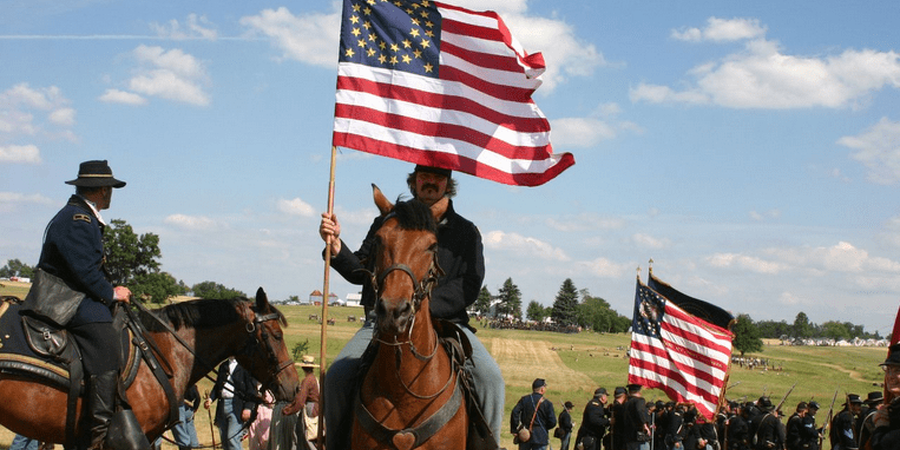PENNSYLVANIA - During the American Civil War, Pennsylvania lived up to its nickname as the "Keystone State," serving as a vital lynchpin for the Union cause. Its strategic location, immense industrial power, agricultural bounty, and the unwavering commitment of its citizens made it indispensable to the war effort. From providing a massive number of soldiers and producing essential war materials to being the site of the war's most pivotal battle, Pennsylvania's role was multifaceted and absolutely critical to preserving the United States.
The "Arsenal of the Union": Industrial and Agricultural Might
Pennsylvania's industrial and natural resources were the engine that powered the Union war machine, earning it the title "Arsenal of the Union."
- Iron and Steel: The Commonwealth produced over 80 percent of the iron for the Union. Its foundries and mills, particularly in Pittsburgh and the Lehigh Valley, churned out railroad rails, ammunition, and armor plating for the revolutionary new ironclad warships. The Fort Pitt Works in Pittsburgh was renowned for its ability to cast the massive cannons used by Union artillery.
- Coal and Fuel: Nearly all of the coal used to fuel the Union's factories, railroads, and naval ships was sourced from Pennsylvania's abundant anthracite and bituminous coal fields.
- Agriculture: Beyond industry, Pennsylvania's fertile farmlands, especially in the Cumberland Valley, were a crucial source of food. The state provided vast quantities of flour, meat, and other provisions to feed the ever-growing Union armies.
Answering the Call: Manpower and Leadership
Pennsylvania's most significant contribution was its people. The state provided a massive number of troops to the Union cause.
- Soldiers and Sailors: Over 360,000 Pennsylvanians served in the Union Army, a number second only to New York. This included more than 8,600 African American soldiers who enlisted in the United States Colored Troops, many of whom were recruited by prominent abolitionists.
- Military Leadership: The state produced some of the Union's most effective and celebrated military leaders. General George G. Meade, a Philadelphian, was the victorious commander of the Army of the Potomac at Gettysburg. General Winfield Scott Hancock, a native of Montgomery County, was a heroic corps commander, and General John F. Reynolds, from Lancaster, was a highly respected leader who was tragically killed on the first day of the Battle of Gettysburg.
The High-Water Mark: The Battle of Gettysburg
In July 1863, the war came to Pennsylvania devastatingly and decisively.
- Lee's Invasion: Confederate General Robert E. Lee brought his Army of Northern Virginia into Pennsylvania in his second invasion of the North, hoping to secure supplies, relieve pressure on war-torn Virginia, and score a victory that might end the war.
- The Turning Point: The resulting Battle of Gettysburg (July 1-3, 1863) was the most significant and bloodiest battle of the Civil War. The Union victory decisively ended Lee's invasion and is widely considered the central turning point of the war.
- The Gettysburg Address: Months later, on November 19, 1863, President Abraham Lincoln delivered his historic Gettysburg Address at the dedication of the Soldiers' National Cemetery, redefining the purpose of the war and immortalizing the sacrifice made on Pennsylvania soil.
The Home Front and the Fight for Freedom
The war effort was profoundly felt on the home front, and Pennsylvania's pre-war role in the abolitionist movement was significant.
- Support Services: Women across the state organized aid societies, sewing uniforms, making bandages, and raising funds for medical supplies. They served as nurses in hospitals, caring for wounded soldiers.
- The Underground Railroad: As the first free state north of the Mason-Dixon Line, Pennsylvania was a critical destination on the Underground Railroad. Its extensive network of secret routes and safe houses, often run by Quakers and a significant free Black population in cities like Philadelphia and Harrisburg, helped thousands escape enslavement. This long-standing commitment to abolitionism fueled the state's dedication to the Union cause.

Sources:
- Pennsylvania Historical & Museum Commission (PHMC)
- Pennsylvania State Archives
- National Park Service (Gettysburg National Military Park)
- Heinz History Center (for Pittsburgh's industrial history)
- Historical accounts and records of the Underground Railroad in Pennsylvania
- Biographies of key figures like General George Meade and Governor Andrew Curtin
- Civil War regimental histories for Pennsylvania units


